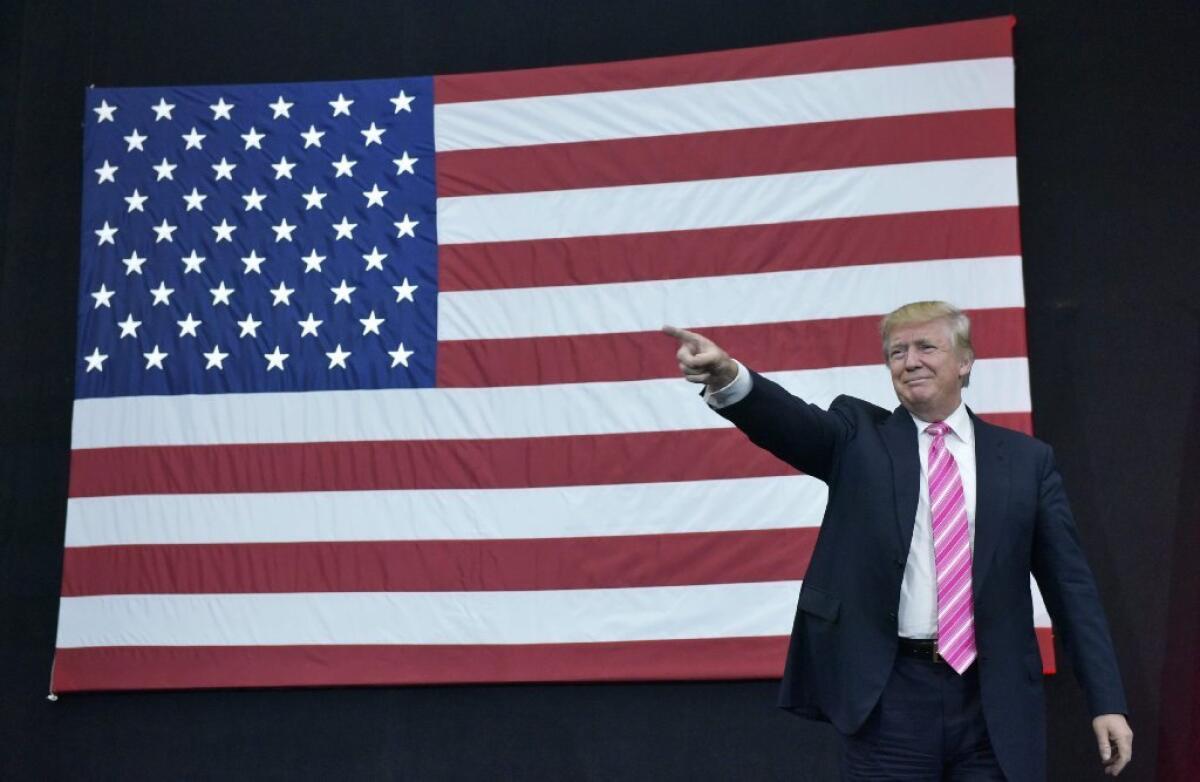Opinion: Trump tweets: Burn the flag, go to jail

At his second debate with Hillary Clinton, Donald J. Trump said that “I am looking to appoint judges very much in the mold of Justice [Antonin] Scalia.” But on Tuesday the itchy-thumbed president-elect tweeted this:
“Nobody should be allowed to burn the American flag - if they do, there must be consequences - perhaps loss of citizenship or year in jail!”
Apparently Trump is unaware that Scalia was in the majority when the Supreme Court held — in 1989 and again in 1990 — that flag-burning as a political protest is “expressive conduct” protected by the 1st Amendment.
And that might not be Trump’s only blind spot when it comes to Scalia’s jurisprudence.
Trump does seem aware that Scalia had a robust view of an individual right to keep and bear arms under the 2nd Amendment. But does he also know that Scalia was a champion of free speech generally (not just in the flag-burning context) as well as a supporter of the 4th Amendment’s protection against unreasonable police searches and a defender of due process for Americans accused of terrorism? (My guess: No.)
It’s not clear why Trump suddenly decided to tweet about flag burning. True, American flags were set on fire during anti-Trump protests shortly after the election, but Trump isn’t known for sitting on a grievance. (One theory floated on Twitter was that Trump was impelled to tweet by a Fox News report about a protest at Hampshire College in Massachusetts, which stopped flying Old Glory after a flag-burning that might have been related to the election.)
On the other hand, it wouldn’t be surprising if Trump’s supporters believed that re-criminalizing desecration of the American flag would help make America great again. In fact, support for outlawing that form of protest remains widespread and isn’t confined to Trump’s political base.
A 2006 USA Today/Gallup poll found that 56% of Americans supported a constitutional amendment that would allow Congress or the states to make it illegal through a statute to burn the American flag. There was less support — 45% — for a constitutional amendment that would directly outlaw flag desecration. In a 2011 survey by the First Amendment Center, 39% of respondents supported the latter sort of amendment.
Also, Trump’s tweet puts him in a long line of politicians from both parties who have played to the crowd on this issue. In 2005 Hillary Clinton, then a senator from New York, introduced a federal statute to criminalize flag-burning. (The headline of a scathing New York Times editorial was: “Senator Clinton, in Pander Mode.”)
Of course, Trump suggested not only making criminals out of flag-burners but stripping them of their citizenship, a penalty that also might be beyond Congress’ power to impose, given Supreme Court precedents. The justices ruled in 1967 in that the government cannot revoke an American’s citizenship without his or her assent.
If such a law were enacted, the Supreme Court would have the final say. Which raises another question: When Trump selects a nominee for the Supreme Court, will he look for another Scalia or for a judge who shares his views about “consequences” for burning the flag?
Follow the Opinion section on Twitter @latimesopinion and Facebook
UPDATES:
2:40 p.m.: This article was updated with information about a protest at Hampshire College in Massachusetts after it stopped displaying the flag.
This article was originally published at 1:55 p.m.
More to Read
A cure for the common opinion
Get thought-provoking perspectives with our weekly newsletter.
You may occasionally receive promotional content from the Los Angeles Times.











